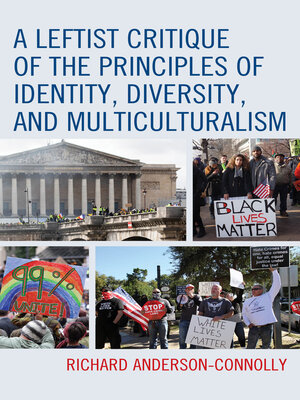A Leftist Critique of the Principles of Identity, Diversity, and Multiculturalism
ebook
By Richard Anderson-Connolly

Sign up to save your library
With an OverDrive account, you can save your favorite libraries for at-a-glance information about availability. Find out more about OverDrive accounts.
Find this title in Libby, the library reading app by OverDrive.



Search for a digital library with this title
Title found at these libraries:
| Loading... |
Identity politics is a lightning rod in American society. To both its progressive supporters and conservative critics, it is seen as defining the agenda of the Left. Both sides are wrong. Identity politics is not a leftist project. Instead it enables the neoliberal political economy that has caused historic levels of inequality and triggered repression and mass incarceration to deal with the social wreckage. Identity politics is a form of biological essentialism, impeding morality built upon universal humanism and politics built upon solidarity.
Unlike the conservative assaults, this book avoids the trivial and silly pronouncements of identity politics (a term generally avoided in the work as loaded and pejorative). It challenges the following key principles of the Identity, Diversity, and Multiculturalism Program: Diversity as Justice—the most important struggle for justice today is increasing the representation throughout society of individuals from historically marginalized groups by ending discrimination on the grounds of race, gender, sexual orientation, and similar characteristics; Colorblindness as Racism—race-neutral solutions to the problems caused by racism are harmful to blacks; Race as Culture—members of different races, specifically blacks and whites in the United States, belong to different cultures; Culture as Virtue—cultures should be respected and celebrated.
This book forcefully argues that none of these tenets is—or rather should be—a leftist commitment.
For progressives who accept the principles, it poses a challenge: How do you defend them from a leftist critique, one that does not deny the continuing significance of discrimination, rather than from the weaker attacks of conservatives?
For those on the Right, this work represents a threat. Once leftists return to their core commitments they will form a powerful movement for political and economic change.
Unlike the conservative assaults, this book avoids the trivial and silly pronouncements of identity politics (a term generally avoided in the work as loaded and pejorative). It challenges the following key principles of the Identity, Diversity, and Multiculturalism Program: Diversity as Justice—the most important struggle for justice today is increasing the representation throughout society of individuals from historically marginalized groups by ending discrimination on the grounds of race, gender, sexual orientation, and similar characteristics; Colorblindness as Racism—race-neutral solutions to the problems caused by racism are harmful to blacks; Race as Culture—members of different races, specifically blacks and whites in the United States, belong to different cultures; Culture as Virtue—cultures should be respected and celebrated.
This book forcefully argues that none of these tenets is—or rather should be—a leftist commitment.
For progressives who accept the principles, it poses a challenge: How do you defend them from a leftist critique, one that does not deny the continuing significance of discrimination, rather than from the weaker attacks of conservatives?
For those on the Right, this work represents a threat. Once leftists return to their core commitments they will form a powerful movement for political and economic change.






